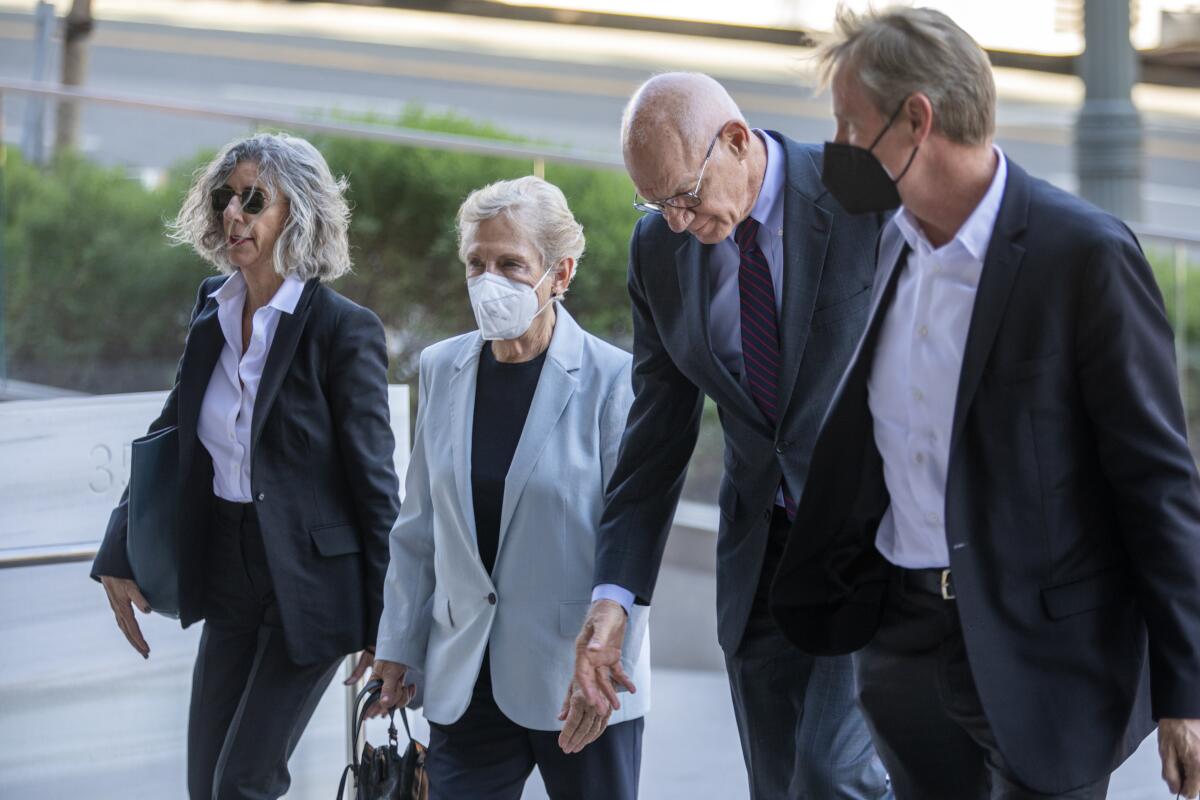Ex-USC social work dean pleads guilty in Mark Ridley-Thomas bribery case

- Share via
For more than two decades leading USC’s social work school, Marilyn Flynn seemed like the model university dean.
She launched a unique program on military social work and secured millions of dollars in congressional appropriations for research on veterans and their families. She made USC the first university to offer a master’s degree in social work online, using generous scholarships to secure high-profile students like Rep. Karen Bass. Under her tenure, enrollment grew from about 500 to 3,500 — making USC the largest social work program in the world.
USC’s former provost praised Flynn as “innovative and entrepreneurial.” Flynn described herself as an institution builder who helped bring “novel, disregarded or even forbidden possibilities to prominence.”
But that quest for growth led to a litany of problems: a financial crisis, aggressive recruitment of students, diluted academic standards and a corruption scandal involving one of L.A. County’s most powerful politicians.
Flynn, 83, pleaded guilty Monday to one count of bribery, admitting that in her desire to secure the renewal of an L.A. County contract for USC’s online mental health clinic, she had agreed to route money from then-Supervisor Mark Ridley-Thomas to his son’s newly formed nonprofit.
Appearing in a downtown Los Angeles courtroom, Flynn said that she accepted $100,000 from Ridley-Thomas’ political campaign and in turn had USC transfer the money to his son’s group — a scheme that prevented it from “being publicly known that the money came from him.”
Flynn said that Ridley-Thomas knew she wanted her contract for USC’s telehealth clinic approved, and that she needed the green light of a high-ranking L.A. County official to seal the deal. Flynn said she agreed to route the money for Ridley-Thomas because “implicitly, I understood” that he would help her set up that meeting.
After Flynn recounted her conduct, U.S. District Judge Dale Fischer asked, “How do you plead?”
“I plead guilty,” the former dean replied.
Vicki Podberesky, one of Flynn’s defense attorneys, said federal prosecutors had initiated contact in recent weeks to negotiate the plea deal. As part of the agreement, prosecutors will recommend at sentencing scheduled for March 2023 that Flynn be punished with home confinement and a fine of no more than $150,000.
Under the terms, she is not required to testify or cooperate.
“What drove Dean Flynn is not personal benefit or reward or personal gain,” Podberesky said. “Everything benefited the community and USC and social work and people who are suffering.”
Citing the pandemic’s impact on healthcare and the wider adoption of virtual appointments, Podberesky called her client a “visionary,” adding, “Telehealth has turned out to be quite an important tool for all of us.”
Flynn had faced multiple counts in what prosecutors characterized as a complex corruption conspiracy involving Ridley-Thomas. A trial for the pair was scheduled Nov. 15.
Both were alleged to be in a quid pro quo that involved Flynn routing the $100,000 for Ridley-Thomas but also working to admit his son, Sebastian, and provide him with a full-tuition scholarship and hire him as a professor. In return, prosecutors say, Ridley-Thomas pushed through favorable and lucrative county contracts sought by Flynn.
Flynn’s plea strikes a blow to Ridley-Thomas’ reputation, with his co-defendant now admitting to joining a bribery scheme in which both had an “implicit” understanding.
But the guilty plea also accomplishes what Ridley-Thomas’ lawyers had unsuccessfully sought earlier this summer, when they filed a motion to sever the case and have the two separately go before a jury.
Without Flynn at the defense table next to Ridley-Thomas, the trial later this year will probably be narrower in scope, with less testimony about the inner workings of USC and more centered on the vast bureaucracy of L.A. County.
But prosecutors could still introduce evidence related to Bass (D-Los Angeles), now a front-runner for mayor. The congresswoman accepted a full scholarship from Flynn in 2011 during her first term in office and later proposed legislation with “input” from the dean. The U.S. attorney’s office in L.A. said earlier this month that Bass was not “a target or a subject of our office’s investigation.”
When Ridley-Thomas sought to separate his case from Flynn’s, his lawyers argued that the Bass scholarship predated the charges in the case and was unrelated to him. Prosecutors countered by saying that evidence of Bass’ scholarship “would be admissible at a severed trial,” showing the wider context of alleged corruption.
“Limiting instructions are more than sufficient to counsel the jury about how it should consider that evidence,” prosecutors wrote in a July court filing.
Ridley-Thomas’ lawyers said in a statement Monday that the agreement signed by Flynn makes “erroneous assumptions” about their client’s thoughts and objectives in dealing with USC.
“Councilman Ridley-Thomas continues to maintain his innocence regarding the misguided charges levied against him by the government. While Ms. Flynn accepted a plea deal, that in no way means Mr. Ridley-Thomas intends to accept a plea deal,” said Galia Amram, one of his defense attorneys.
“We look forward to our day in court and to clearing Councilman Ridley-Thomas’ good name — a name that his constituents have respected and relied upon for decades.”
More to Read
Sign up for Essential California
The most important California stories and recommendations in your inbox every morning.
You may occasionally receive promotional content from the Los Angeles Times.














